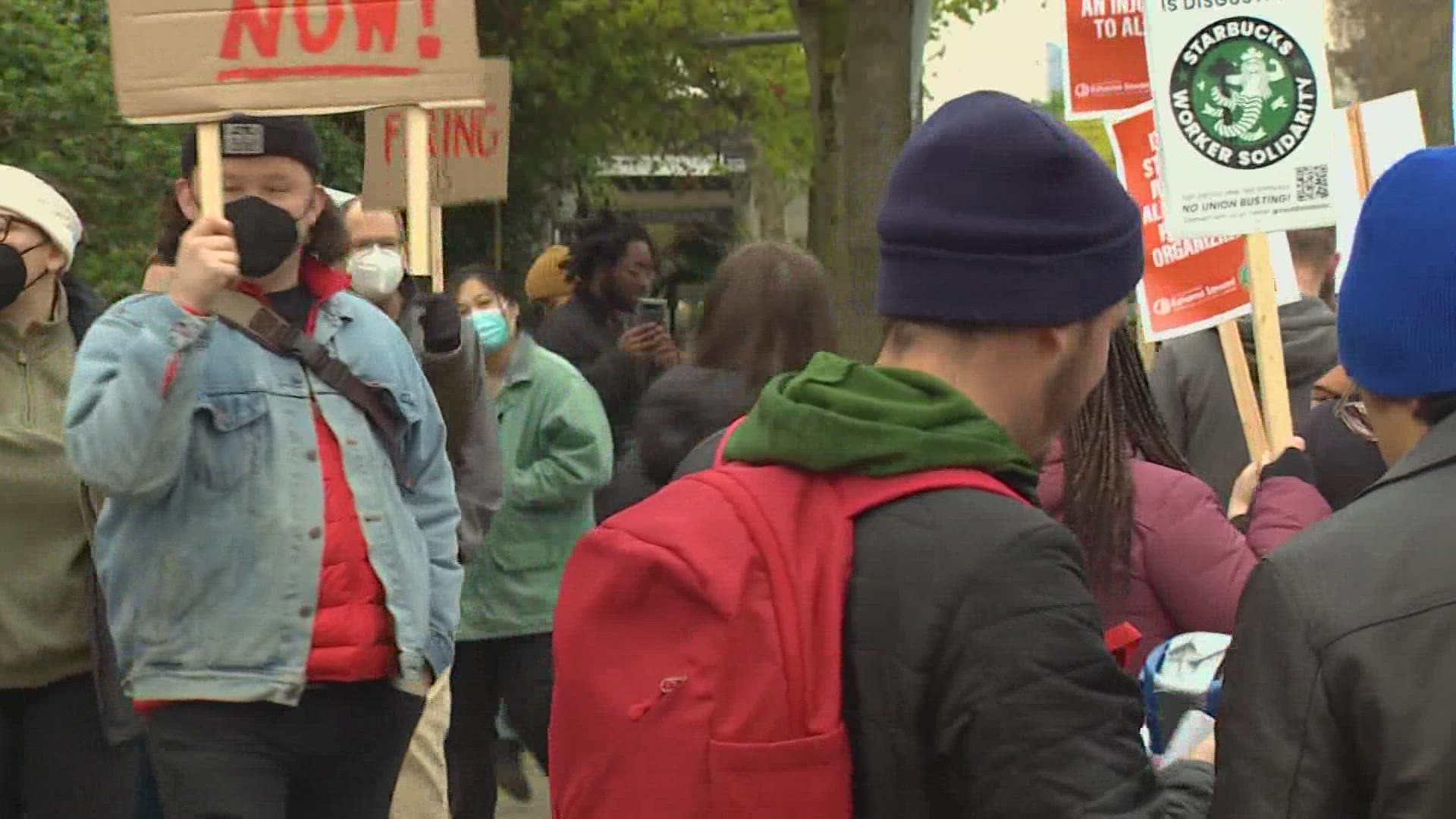Starbucks’ sales climbed to record levels in its fiscal second quarter, but its profits took a hit from climbing labor costs. And those costs are set to grow even higher in the coming months as Starbucks introduces new pay raises and other benefits to improve its employee experience -- and head off a growing unionization movement.
The Seattle coffee company -- which welcomed back former CEO Howard Schultz last month as its interim leader -- said revenue rose 15% to a record $7.6 billion in its 13-week quarter, which ended April 3. That was in line with Wall Street’s estimates, according to analysts polled by FactSet.
But net earnings rose just 2% to $674 million. Starbucks’ adjusted earnings of 59 cents per share fell short of analysts’ forecast of 60 cents.
Starbucks noted that it faced higher employment costs during the quarter. Last fall, the company announced a $1 billion investment in employee wages and benefits in an effort to lift U.S. workers’ pay to at least $15 per hour by this summer.
Worker benefits, with a catch:
On Tuesday, after a series of meetings with workers around the country, Schultz unveiled $200 million in additional investments in worker pay and training. That includes raises for employees who have been at the company for at least two years as well as a near doubling in training time -- from 23 hours to 40 hours -- for new baristas and shift supervisors. Starbucks is also reintroducing a coffee mastery program for employees and considering other benefits like increased sick time.
But there’s a catch: Workers who have voted to unionize or stores that have petitioned to hold a union election won’t be eligible for the enhanced benefits announced Tuesday. Instead, Schultz said U.S. labor law requires stores to negotiate their own contracts with Starbucks.
“We do not have the same freedom to make these improvements at locations that have a union," Schultz said.
Starbucks Workers United, the group behind the unionization effort, disagrees, and said it filed charges with the National Labor Relations Board against Starbucks on Tuesday. The group said the company is violating labor law for threatening to exclude unionized stores from receiving the new benefits.
“These benefits, including ones we’ve demanded since the beginning of our campaign, are a response to our organizing efforts and we should celebrate the hard work that partners who stood up to Howard Schultz’s bullying put in to make this happen,” the group said Tuesday in a statement.
As of Tuesday, workers at more than 250 U.S. stores have filed petitions with the labor board to hold union elections, labor organizers said. At least 50 of those stores have voted to unionize with Workers United, a branch of the Service Employees International Union.
Schultz opposes unionization. But he noted that employees are under “tremendous strain” due to strong customer demand and pandemic-related changes in the business, including a surge in mobile and drive-thru orders. Stores are built to serve hot drinks, for example, but 80% of U.S. orders are now cold drinks.
“These young people have completely valid concerns given today’s uncertainty and economic instability. They look around and they see the burgeoning labor movement as a possible remedy to what they are feeling,” Schultz said. “But compare any union contract in our sector to the constantly expanding list of wages and benefits we have provided our people for decades, and the union contract will not even come close to what Starbucks offers.”
Schultz said the new investments will improve employee recruiting and retention. Starbucks also plans additional changes it will outline at an investor meeting in September, including adding credit and debit card tipping in its stores and accelerating the rollout of new ovens and espresso machines.
“If we want to exceed the expectations of our customers, we have to exceed the expectations of our people," Schultz said.
Schultz bought the Starbucks chain in 1987, led it until 2000 and then led it again between 2008 and 2017. He returned as interim CEO and rejoined Starbucks' board in April after former CEO Kevin Johnson announced his retirement.
Schultz said the board is interviewing candidates and expects to name its new CEO in the fall. After training that person, Schultz said he plans to leave the company __ but not the board __ in early 2023.
Investors seemed glad to have him back. Starbucks shares were up 5% in after-hours trading Tuesday.
Schultz said customer demand for Starbucks remains strong despite several price increases over the last year.
Starbucks' same-store sales __ or sales at stores open at least a year __ rose 7% globally in the second quarter, surpassing Wall Street’s estimate of 6.5%. That was largely on the strength of the business in North America, where same-store sales rose 12%.
International same-store sales fell 8%, largely due to coronavirus restrictions in China. China, which is Starbucks' largest market outside the U.S., saw same-store sales plummet 23% in the quarter, the company said. Roughly one-third of stores in China were closed or offering mobile ordering only at the end of the second quarter.

